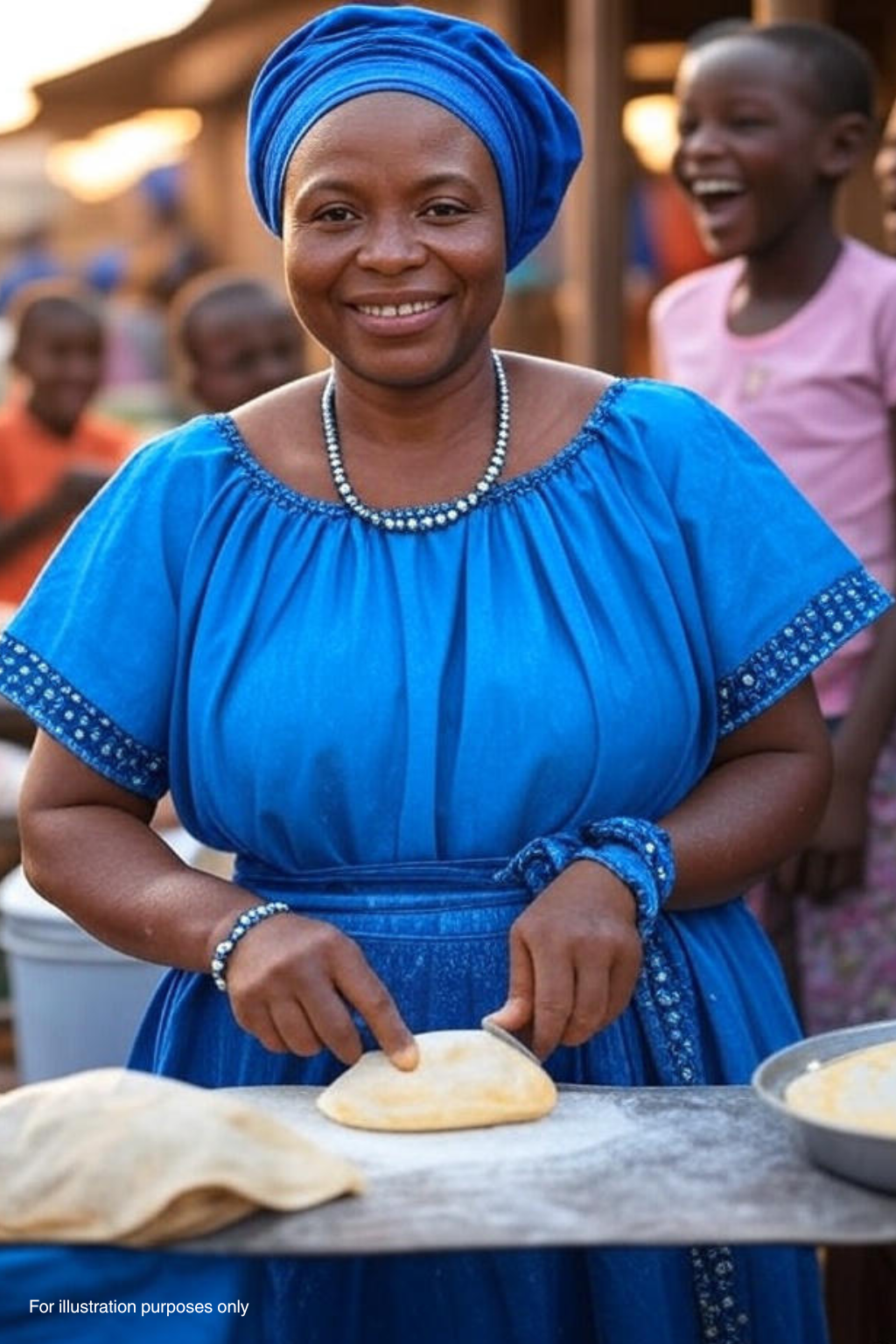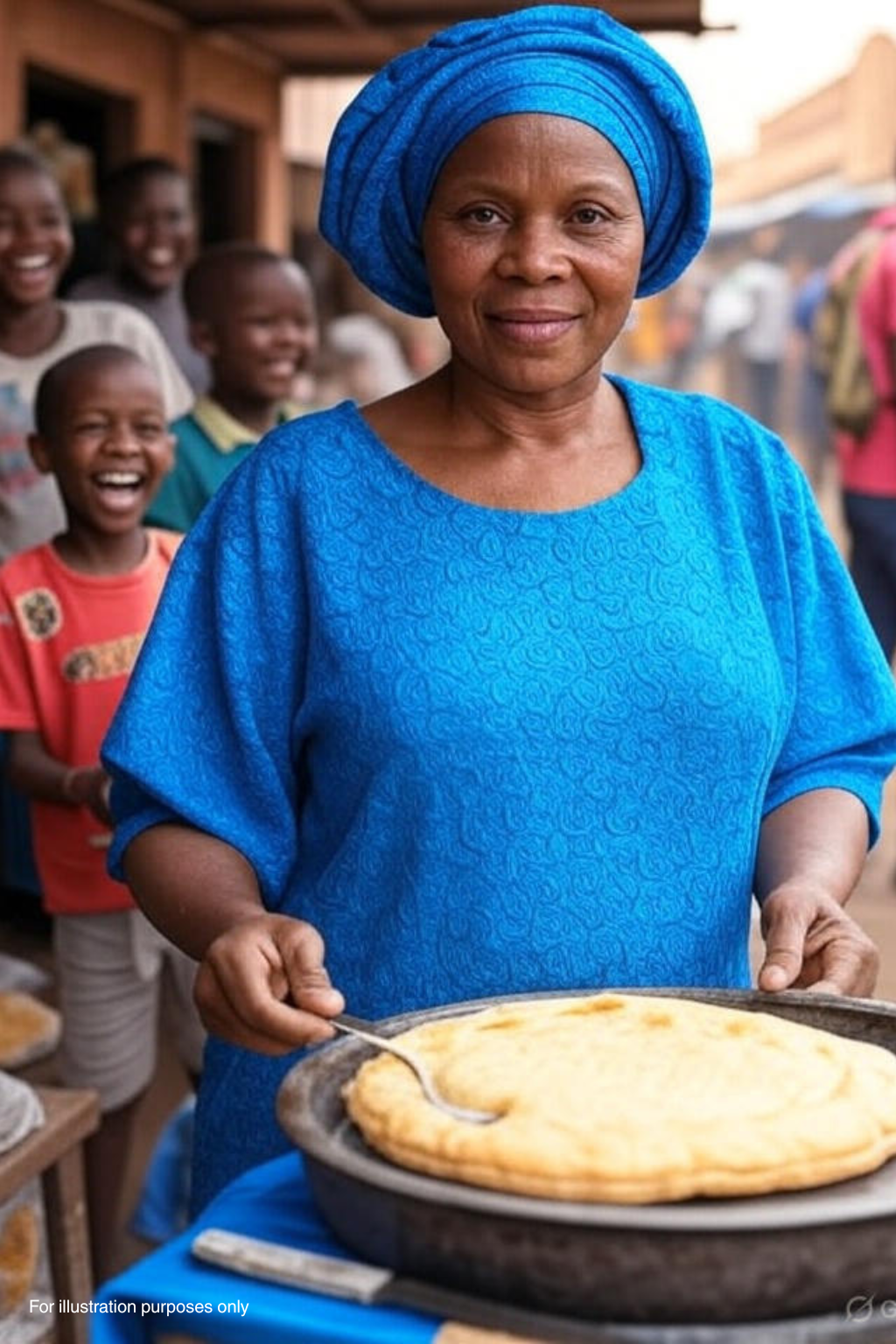PART ONE — ASHES AND ACCUSATIONS
My name is Ozioma. I became a widow at twenty-nine.
My husband, Uchenna, was a proud man. A supervisor at GoldenCore Manufacturing — a titan of industry in our town. Every day, he left home early with his lunchbox and returned with stories of factory life and dreams of a better future.
Then one morning, he came home early. Pale. Silent.
“They said I stole machine parts,” he whispered. “No proof. Just blame. They want someone to punish.”
He was dismissed without severance. No pension. No apology. No dignity.
Three weeks later, I found him collapsed in the bathroom. His eyes glassy, his breath stolen. A silent stroke. He died before the ambulance arrived.
I buried him under a weeping sky, our toddler son Ebuka clinging to my waist. No job. No savings. Only silence, shame, and memories.

I pawned my wedding ring for ₦5,000. Borrowed ₦2,000 from Mama Nkechi, bless her soul. Bought flour, sugar, and oil.
And I began. One basin. One wooden spoon. Selling puff-puff.
Every morning, I carried that basin to the very gates of GoldenCore — the place that broke us. I fried in the sun. I stood in the rain.
I smiled through the stares. I ignored the whispers:
“Na she be that widow wey her husband chop sack.” “Now she dey hawk puff-puff? Hmm.”
I swallowed pride for profit. Because Ebuka needed me.
We lived lean. He read with torn books. Ate bean porridge seasoned with hope. And when he asked:
“Mummy, are we poor?”
I’d press his cheek to mine and say:
“We’re rich — in love and fight. The rest will follow.”
Ebuka was not born ordinary. By age ten, he was solving math puzzles that baffled grown-ups. By thirteen, he was spelling champion in three local governments. By sixteen, he earned a full scholarship to study computer science.
He juggled classes with night shifts. Taught tutorials. Built websites in the dark corners of internet cafés.
Then came the Lagos Tech Summit. He entered a startup contest. Built an app overnight. And won ₦2 million.
He came home breathless. In tears.
“Mummy,” he said, clutching my hand. “You never broke. This is your harvest.”
He bought new equipment. Rebranded my stall. Painted a wooden sign: “Mama Zee’s Delight.”
Photos went viral. Bloggers came. People drove for hours for my puff-puff.
But my boy… my boy wasn’t done.

Years passed. Ebuka launched a logistics-tech company. He hired young men and women from slums and suburbs. He scaled fast. Nationwide.
One evening, he returned with a document.
“Mummy,” he said quietly. “Do you remember GoldenCore?”
My breath caught.
“Yes.”
“They went bankrupt. I bought the company. Every factory, every floor, every file.”
The air stood still.
He knelt before me. Placed the deed in my hands.
“They discarded Daddy. Made you hawk puff-puff at their gates. But today… you own those gates.”
I couldn’t speak. Only weep. Not from sadness. But from justice.
At the reopening ceremony, I wore a deep red wrapper. Gold blouse. Wrinkles of wisdom, not defeat.
Executives from the past were invited. They came.
When I stood beside Ebuka on stage, the room turned. Whispers rippled.
“Isn’t that the widow? The puff-puff woman?”
I took the microphone.
“They tried to bury me,” I said slowly. “But I was a seed. I grew through fire. Through flour. Through humiliation. And the boy you ignored — now holds your contracts.”
Applause thundered. Some eyes welled with tears. But I only saw a quiet, dignified reckoning.
Today, Mama Zee’s Delight is a chain of puff-puff shops. Across Lagos. Abuja. Port Harcourt.
We fund widow cooperatives. Sponsor orphans. Give microloans to mothers with nothing but grit.
Ebuka is now a speaker, a mentor. He tells every audience:
“Everything I am, I owe to puff-puff, prayer, and a mother who refused to bow.”
And me?
I still wake at dawn. Still fry puff-puff on some Saturdays. Not for money.
But to remember. That fire doesn’t always destroy.
Sometimes — it makes gold.